Anarchy Defined as Nation-State Organization
On Sunday November 27,1938 The London Observer covered a speech by Lord Lothian, the wartime British Ambassador to the United States. The speech was titled “Wings Over History, A New Civilization.” In his speech he stated:
“the anarchy of multitudinous national sovereignties is about to dissolve . . . the world is going to fall into four or five main political and economic groups, each in great measure self-supporting, each under the leadership of a great State equipped with modern military and air power . . .”
America was Hijacked By Carnegie Internationalists
In 1903, Andrew Carnegie donated $1.5 million dollars to build the Palace of Peace at The Hague. The purpose was to house the newly formed Permanent Court of Arbitration. In 1904, a special foundation was set up to manage the funds and the preparations of the construction. The Carnegie Foundation remains the owner and manager of the grounds but they do get some financial support from the Ministry of Foreign Affairs of the Netherlands. Source: The Hague Carnegie Foundation Brochure (Note: the image below moves so move it up so you can read the Mission)
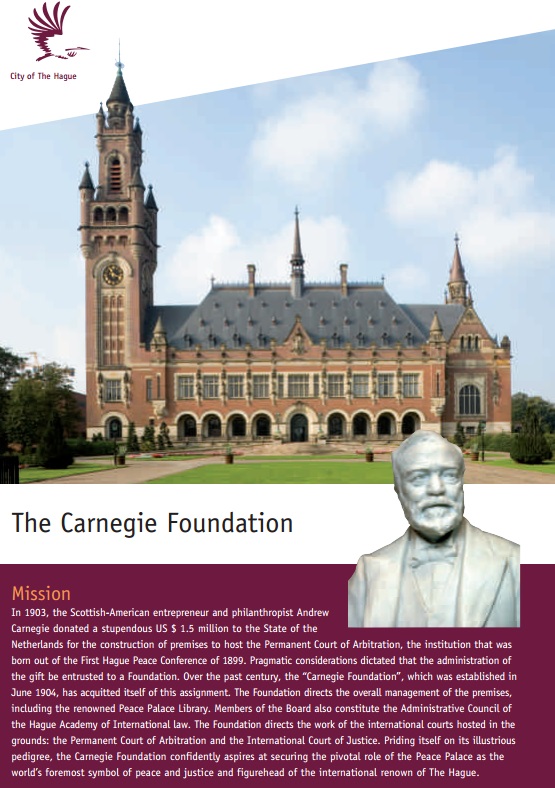
History of the International Court of Justice and the Permanent Court of Arbitration
The modern history of international arbitration is, however, generally recognized as dating from the so-called Jay Treaty of 1794 between the United States of America and Great Britain. This Treaty of Amity, Commerce and Navigation provided for the creation of three mixed commissions, composed of American and British nationals in equal numbers, whose task it would be to settle a number of outstanding questions between the two countries which it had not been possible to resolve by negotiation. (Jay Treaty link to the right. See Articles 5,6,7 for Commissions)
Elihu Root
Strategy of Conquest of the United States:
Arbitration – international
Credentialing per the system of livery companies of the City of London – control entry to the field and you control the field
Capture the field of foreign policy – the State Department
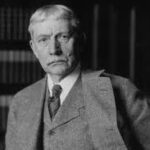 Elihu Root, Secretary of State (1905-1909)
Elihu Root, Secretary of State (1905-1909)
Despite his reluctance to involve the United States in issues in which it had limited interests, Root negotiated arbitration treaties with 24 nations. Root was awarded the Nobel Peace Prize in 1912 (several years after he was Secretary of State) for his work on international arbitration.
Root also worked to reorganize the Department of State in unprecedented ways. Root sought to professionalize the Foreign Service and Consular Service and created the first Foreign Service Exam. He instituted new methods of recordkeeping in the Department, devised a system of rotating members of the diplomatic service to give them greater experience, and organized the Department by geographic regions. These reforms would ultimately prove to be more enduring than Root’s contributions to foreign policy.
1899 Hague Peace Conference History, Research by D. Niwa, Scribner’s 1913 History of the United States, Chapter V, International Arbitration
Scribner’s History of the United States, 6 volumes
Jay Treaty – Treaty of Amity Commerce and Navigation between His Britannic Majesty, and The United States of America. Negotiated by Supreme Court Chief Justice John Jay. Signed November 19, 1794. Ratified August 14, 1795. Effective February 29, 1796.
Control the standards and certification of professionals and you own the profession by virtue of entry and access to the profession.
To understand the significance of the Carnegie Foundations, you must understand the City of London Livery Companies. City of London Livery Companies – Service Companies. Service to the Profession or Trade.

James T. Shotwell, A Life Devoted to Organizing Peace
A History of the New World Order, Chapter 8, The Illuminati Influence On International Affairs
Between 1952 and 1954, there were two committees of Congress that investigated the Tax-Exempt Foundations. Eugene E. Cox, Chairman of the first committee died suddenly just before the release of the Final Report . . .
Organization of Power – Part 7
[ Note: Organization of Power series – right hand panel, also see Empire of the Black Robes ]
Chambers had described his 15 years’ service as a Soviet agent. In 1939, he said, two years after he had “repudiated Marx’s doctrine,” he told Assistant Secretary of State Adolph A. Berle, Jr., about Communists in the U.S. government. One, he said, was Alger Hiss, who had been a State Department official and who later organized the U.S. representation at Yalta, as well as the conferences at Dumbarton Oaks and San Francisco, that launched the United Nations.
Alger Hiss, President of the Carnegie Endowment for International Peace, 1947
List of former Secretaries of State
Administrative Timeline of the Department of State
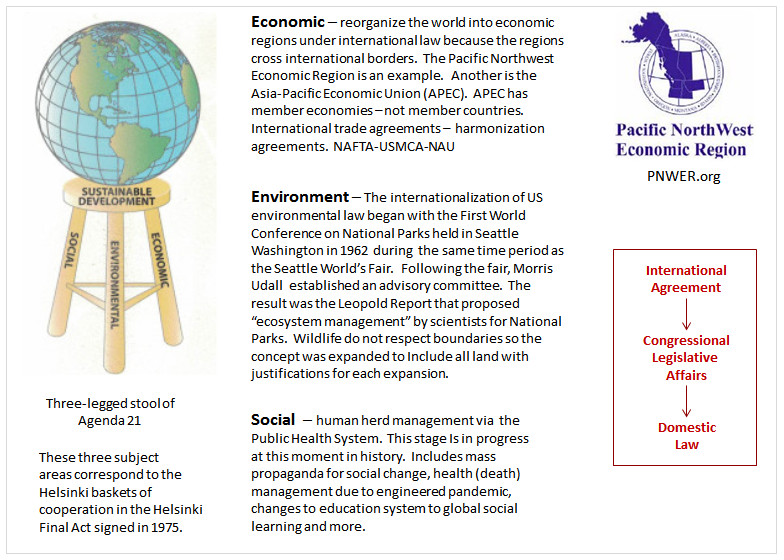
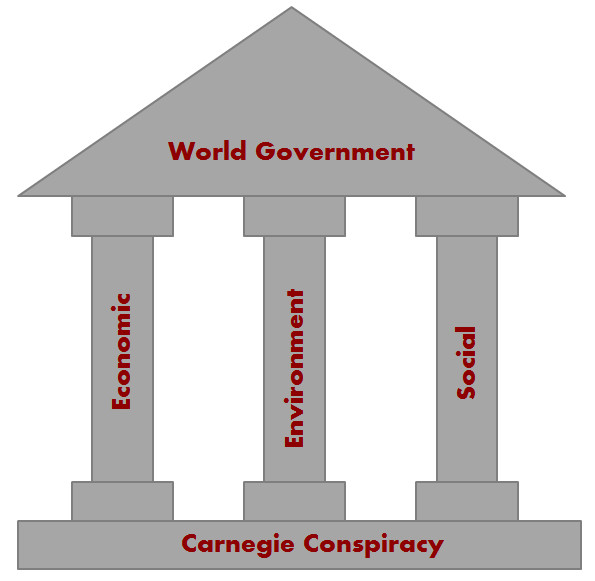
End of the Westphalian System of Nation States

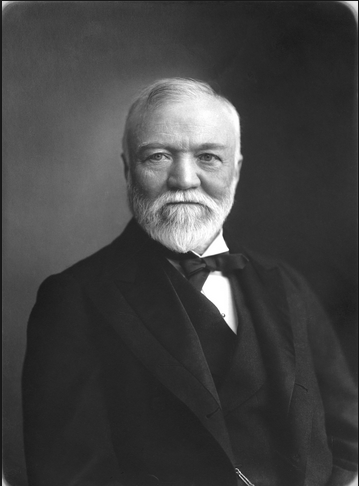

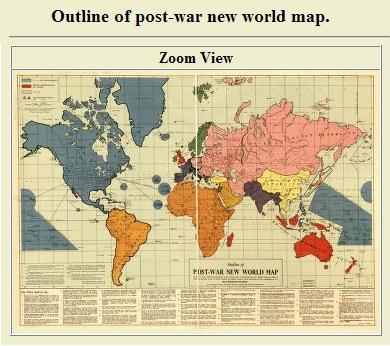




3 Comments
jboydwalker@protonmail.com
I am going to have to play the devil’s advocate in regards to titling this “The Carnegie Conspiracy” (and therefore the whole rabbit hole you have slipped into with the rest of your analysis). I will start with the bottom line of my reasoning, and then drop down my own “logic hole”. And most of my presumption about 1898 being the nexus of this “One World Thought” is taken from Stephen Kinzner’s book on the Carnegie period “The True Flag” in which he identified Carnegie as one of the only real forces at that time, in the politics of anti-interventionism (American Militarism). Along with Mark Twain, he was one of many who were serious about extending American Military Power, and thus neo-colonialism, beyond it’s existing frame-of-reference.
I think my logic is correct it means that American Militarism was the principle that the had to be dealt with at the social/organizational (threat?) level.
I believe that all of the ancillary movements socially and culturally were a reaction of powers, principalities, and bureaucracies and new money elites of Europe set in motion as a result of American Come-upped-ness so-to-speak. residing pacifically as the Western Cradle of Civilization visa vi Central Europe and Britain, IN RESPONCE TO the aggressive and undeniably bellicose behavior coming out of the USA in 1898, i.e. America’s first tiptoe into neo-colonialism.
I think that at this first real go at American Interventionism – Theodore Roosevelt was the first American Fascist – personifying the idea wealth, pugnacity, and of of American Exceptionalism, and idea that European Elite’s couldn’t really get their heads around, or hadn’t considered very deeply. Enthusiastically reinforced by the William Randolph Hearst Communications Monopoly on the public relations side from coast, to coast these two personalities had more to do with the change of American self-understanding by means of War Fever and Propaganda (and you could say political schizophrenia) at the turn of the century. I believe that all of the ancillary movements socially and culturally resulting in the energy put into the matrix you present in the flow WERE AT THERE BASIS, A REACTION of powers, principalities, and bureaucracies various Nation States of Europe, residing pacifically as the Western Cradle of Civilization visa vi Central Europe and Britain, in response to the aggressive and undeniably bellicose behavior coming out of the USA in 1898, i.e. America’s first tiptoe into neo-colonialism.
Your flowchart connecting all of the funding of “socially conscious” organizations is in my view reactionary, euro-centric, and bureaucratic expressionism , that formed a consensus within the high humbugger in reaction to America. Early NGO’s and/or thinktanks if you will.
The problem was Theodore (Uncle Teddy) Roosevelt and Wm Randolph Hearst and the True Movers and Shakers of Interventionism to a much larger degree than Carnegie, in my opinion that led to the mindsets that enabled the flowchart. Teddy, throughout his life and political career was the standard bearer for the American Interventionist side – American Jingoism from the Republican Side – which lead to the military adventurism of Cuba, the Philippines,
The history of this incredibly important time in the rise of technologically superiority of the first world began of course in Europe with America as the embarrassing cousin that the old landed money keep in the closet…this status would change in the period follow of American Mechanical Achievements after the Civil War. This is a worldview analysis from the Euro-centric side that I believe was true until American Money, organizational power, and gun powder can to rescue the British Empire in 1917-1918 which gave the USA street cred with the Empire, no matter what other stories the American Propaganda outlets and historical revisionists would have us believe.
Carnegie was definitely a precursor/contributor to the phenomena of Industrial Plutocrats forming what “they” considered philanthropy evolving into tax free trusts of many dubious but always progressive shades of black and white. He had philanthropic trusts both in the U.S. and Britain so he was actually taking on a kind of mantle of cousinhood in the way he guide his fortune, socially. of “Modernity” as a corollary to the Industrial Transformation of Society (“Industrial” Revolution i.e. a Progressive Mentality in trade, science and technology as a worldview) started in the 1830’s of course in Mother England and turned out to be revolutionary in the true sense of “Technological Revolution” due to its evolving world scale in terms of mechanics, finance, science an the subsequent evolution in political centers of gravity. We were in a sense, very much beholding on progressive new ideas mostly in the industrial arts, science, technology and education before we becoming joined at the hip politically by supporting the British side in WWI.
All this correlated, but was delayed by restraints in information across the Atlantic with any efficiency until after the American Civil War and then mostly only for Governmental and Military Communication.
Mid-19th Century US, newspaperman John O’Sullivan first coined the term Manifest Destiny that is considered at that time to be a widely held cultural concept (like every nation to expand the frontier), a galvanizing concept for the democrats, and though Lincoln claimed to be against the concept he actually enabled it in a technical sense, with Federal Centralization and Continental Connectivity by means of railroads being an economic driver to west after his assassination.
jboydwalker@protonmail.com
My apologies for the lack of editing and other apparent errors. However, I think you get my patriotic drift. I am responding to what you see as a systems problem, which it has become, but may have intended to be the systems solution from the elites of the (gay) 1890’s, in the history of the times.
Vicky Davis
I’m not going to spend too much time responding to this because I have other information to add that talks about Carnegie and his funding of the Pan American Union building in Washington DC. The building to provide a place for the traitors who intended to build the Pan American Union (aka the Organization of American States; aka Free Trade Area of the Americas).
Obviously I can’t write the history of the world in one article. At the bottom of this article, you’ll find an agreement between the International Chamber of Commerce (ICC) and the Carnegie Endowment for International Peace. Carnegie and Rockefeller were both involved in the ICC.
http://www.channelingreality.com/Corporations/organization_of_power_7.htm
It’s not a difficult concept to understand that the turn of the century industrialists saw the government as an impediment to their monopoly dreams. The Foundations – Carnegie and Rockefeller have been working at the goal of breaking the nation-state ever since their formation.
Hang on until I finish it.